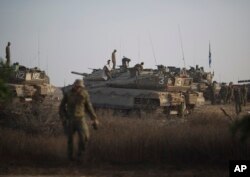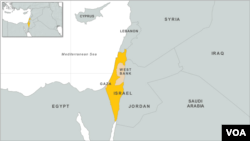With dozens of people reported killed, United Nations Secretary General Ban Ki-moon is calling the latest surge of violence between Israel and the Palestinians one of the most critical tests the Middle East has faced in years, and warned against any further escalation of hostilities in and around the Gaza Strip.
“The risk of violence expanding further still is real. Gaza, and the region as a whole, cannot afford another full-blown war,” said Ban.
Israeli jets bombarded Palestinian targets across Gaza Wednesday, while Hamas militants fired rockets into the Jewish state's heartland.
Palestinian officials say at least 44 people have been killed in Gaza this week, including women and children. Israel reported no deaths.
The U.N. Security Council is scheduled to meet at 10 a.m. (1400 GMT) on Thursday to discuss the situation.
The U.N. chief said he spent much of the day on the telephone with world leaders, including Egyptian president Abdel Fattah al-Sissi, looking for ways to contain the crisis.
“Regional leaders have a vital role to play and I urged President Sissi and others to help facilitate a return to the November 2012 ceasefire agreement,'' Ban said.
Ban also spoke with Israeli Prime Minister Benjamin Netanyahu, Palestinian President Mahmoud Abbas, U.S. Secretary of State John Kerry, the king of Saudi Arabia and the emir of Qatar.
Ban condemned as “unacceptable” the multiple rocket attacks launched from Gaza on Israel, but also called on the Jewish state to “exercise maximum restraint and to respect international obligations to protect civilians.”
Situation on the ground
Explosions rocked Gaza, as Israel launched more than 200 air strikes against the ruling Islamic militant group Hamas and other armed Palestinian factions. The Israeli military said targets include the homes of Hamas leaders, smuggling tunnels and weapons depots.
Pillars of black smoke from the bombing targets filled the skies over densely populated Gaza. Palestinian rescue and medical officials sifted through the wreckage at the 560 sites Israel said its warplanes had hit since the operation began early Tuesday -- aimed at stopping a wave of Palestinian rocket attacks.
Israel's Strategic Affair Minister Yuval Steinitz said there is much more to come.
"This offensive will not be short," Steinitz told Israel Radio, "because we are determined to restore peace and quiet to the citizens of Israel." He said the army would impose a severe blow on the military capabilities of Hamas.
Steinitz said Israel also is preparing for a possible ground offensive, after the government authorized the army to call up 40,000 reservists.
Hamas strikes deep
Hamas is not backing down. It continues to fire rockets deeper into Israel. Many of the rockets have been shot down by Israel's Iron Dome anti-missile system.
Israel reported no deaths, but air raid sirens could be heard in the key Israeli business center of Tel Aviv, in Jerusalem and beyond as Hamas fired rockets deeper into Israel than ever before.
Israeli media reported that two rockets landed in the Mediterranean Sea near the northern port city of Haifa, 165 kilometers from Gaza, and the government said Hamas has dozens of longer-range rockets.
Hamas official Mushir Al Masri was speaking to reporters in Gaza as a bomb struck nearby. He said if Israel thinks "it can empty Hamas' weapons arsenals in days, weeks or months, it is gravely mistaken. He said Hamas has endurance and it is prepared to fight for a long time.
Intense fighting
Israeli military mission, "Operation Protective Edge," is aimed at blocking Hamas from firing rockets at Israel. The offensive, however, has set off the most intense fighting between Israel and Hamas since an eight-day battle in late 2012.
Israeli public security minister Yitzhak Aharonovich vowed to continue the assault on Gaza.
"We will not stop. They'll first receive a hard blow, from both the air and the sea," said Aharonovich. "And if a ground invasion is needed, there will be a ground invasion. All options are open, but we need to restore calm."
Pillars of black smoke from the bombing targets filled the skies in densely populated Gaza. Palestinian rescue and medical officials sifted through the wreckage at the 430 sites Israel said its warplanes had hit since the operation began early Tuesday.
Hundreds of mourners carried the bodies of those killed in raucous funeral processions through Gaza streets.
Obama urges peace
U.S. President Barack Obama said in a column published Wednesday in Germany that "everyone involved" should act in a sensible and measured way, rather than seek revenge or retaliation. His words were published in the German newspaper Die Zeit. He reiterated U.S. support for a two-state, Israeli-Palestinian solution and added that "both sides must be prepared to accept risks for peace."
U.S. Secretary of State John Kerry telephoned Netanyahu Wednesday and was also to call Palestinian President Mahmoud Abbas.
The State Department provided no details of the phone call, but said Washington urges all sides to de-escalate the situation.
Palestinian President Mahmoud Abbas made a televised statement late Tuesday in which he called on international bodies such as the Mideast Quartet and the United Nations Security Council to "take responsibility to guarantee the safety" of the Palestinian people. He asked Palestinians to be "united and patient" and promised the government would do its best to fulfill their needs.
Israel's defense chief, Moshe Ya'alon, said Tuesday the country is prepared for a campaign "which will not end within days."
Israeli tanks and other armored vehicles were seen massing near the Gaza border, and a military spokesman said the army was recruiting reserve troops for a potential ground mission.
The kidnapping and killing of three Israeli teenagers and a Palestinian youth have helped to further escalate tensions in the past week. Both Israeli Prime Minister Benjamin Netanyahu and Abbas have condemned the acts and vowed to punish those responsible.
Israeli investigators said this week that three of six Jewish suspects accused of killing 16-year-old Mohammed Abu Khdeir have confessed to the crime and re-enacted it for authorities. It is believed the Palestinian was killed as revenge for the deaths of the Israeli teens.
Israel blames Hamas for the killing of the Israeli youths. Hamas has denied responsibility.
Margaret Besheer contributed to this report from the United Nations; Robert Berger from Jerusalem. Some information was provided by AP, AFP and Reuters.







